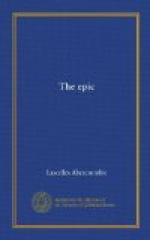But the various appearances of the Heroic Age cannot, perhaps, be completely generalized. What has just been written will probably do for the Heroic Age which produced Homer, and for that which produced the Nibelungenlied, Beowulf, and the Northern Sagas. It may, therefore stand as the typical case; since Homer and these Northern poems are what most people have in their minds when they speak of “authentic” epic. But decidedly Heroic Ages have occurred much later than the latest of these cases; and they arose out of a state of society which cannot roundly be called savagery. Europe, for instance, had its unmistakable Heroic Age when it was fighting with the Moslem, whether that warfare was a cause or merely an accompaniment. And the period which preceded it, the period after the failure of Roman civilization, was sufficiently “dark” and devoid of individuality, to make the sudden plenty of potent and splendid individuals seem a phenomenon of the same sort as that which has been roughly described; it can scarcely be doubted that the age which is exhibited in the Poem of the Cid, the Song of Roland, and the lays of the Crusaders (la Chanson d’Antioche, for instance), was similar in all essentials to the age we find in Homer and the Nibelungenlied. Servia, too, has its ballad-cycles of Christian and Mahometan warfare, which suppose an age obviously heroic. But it hardly falls in with our scheme; Servia, at this time, might have been expected to have gone well past its Heroic Age. Either, then, it was somehow unusually prolonged, or else the clash of the Ottoman war revived it. The case of Servia is interesting in another way. The songs about the battle of Kossovo describe Servian defeat—defeat so overwhelming that poetry cannot possibly translate it, and does not attempt it, into anything that looks like victory. Even the splendid courage of its hero Milos, who counters an imputation of treachery by riding in full daylight into the Ottoman camp and murdering the Sultan, even this courage is rather near to desperation. The Marko cycle—Marko whose betrayal of his country seems wiped out by his immense prowess—has in a less degree this utter defeat of Servia as its background. But Servian history before all this has many glories, which, one would think, would serve the turn of heroic song better than appalling defeat and, indeed, enslavement. Why is the latter celebrated and not the former? The reason can only be this: heroic poetry depends on an heroic age, and an age is heroic because of what it is, not because of what it does. Servia’s defeat by the armies of Amurath came at a time when its people was too strongly possessed by the heroic spirit to avoid uttering itself in poetry. And from this it appears, too, that when the heroic age sings, it primarily sings of itself, even when that means singing of its own humiliation.—One other exceptional kind of heroic age must just be mentioned, in this professedly inadequate summary.




